Related Research Articles
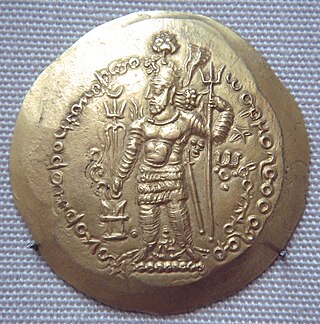
Year 272 (CCLXXII) was a leap year starting on Monday of the Julian calendar. At the time, it was known as the Year of the Consulship of Postumius and Veldumnianus. The denomination 272 for this year has been used since the early medieval period, when the Anno Domini calendar era became the prevalent method in Europe for naming years.
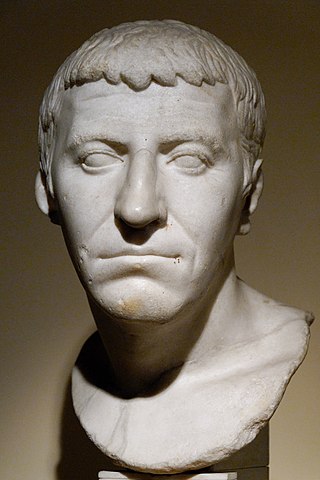
Gaius Cassius Longinus was a Roman senator and general best known as a leading instigator of the plot to assassinate Julius Caesar on 15 March 44 BC. He was the brother-in-law of Brutus, another leader of the conspiracy. He commanded troops with Brutus during the Battle of Philippi against the combined forces of Mark Antony and Octavian, Caesar's former supporters, and committed suicide after being defeated by Mark Antony.
Marcus Cornelius Fronto, best known as Fronto, was a Roman grammarian, rhetorician, and advocate. Of Berber origin, he was born at Cirta in Numidia. He was suffect consul for the nundinium of July-August 142 with Gaius Laberius Priscus as his colleague. Emperor Antoninus Pius appointed him tutor to his adopted sons, the future emperors Marcus Aurelius and Lucius Verus.

Eunapius was a Greek sophist, rhetorician, and historian from Sardis in the region of Lydia in Asia Minor of the fourth century AD. His principal surviving work is the Lives of Philosophers and Sophists, a collection of the biographies of 23 philosophers and sophists. The exact date of his death is unknown but speculated sometime after 414 AD during the reign of Theodosius II
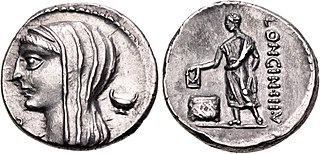
The gens Cassia was a Roman family of great antiquity. The earliest members of this gens appearing in history may have been patrician, but all those appearing in later times were plebeians. The first of the Cassii to obtain the consulship was Spurius Cassius Vecellinus, in 502 BC. He proposed the first agrarian law, for which he was charged with aspiring to make himself king, and put to death by the patrician nobility. The Cassii were amongst the most prominent families of the later Republic, and they frequently held high office, lasting well into imperial times. Among their namesakes are the Via Cassia, the road to Arretium, and the village of Cassianum Hirpinum, originally an estate belonging to one of this family in the country of the Hirpini.
Maximus of Tyre, also known as Cassius Maximus Tyrius, was a Greek rhetorician and philosopher who lived in the time of the Antonines and Commodus, and who belongs to the trend of the Second Sophistic. His writings contain many allusions to the history of Greece, while there is little reference to Rome; hence it is inferred that he lived longer in Greece, perhaps as a professor at Athens. Although nominally a Platonist, he is really a sophist rather than a philosopher, although he is still considered one of the precursors of Neoplatonism.
On the Sublime is a Roman-era Greek work of literary criticism dated to the 1st century C.E. Its author is unknown, but is conventionally referred to as Longinus or Pseudo-Longinus. It is regarded as a classic work on aesthetics and the effects of good writing. The treatise highlights examples of good and bad writing from the previous millennium, focusing particularly on what may lead to the sublime.
Longinus may refer to:
Cassius Longinus may refer to:
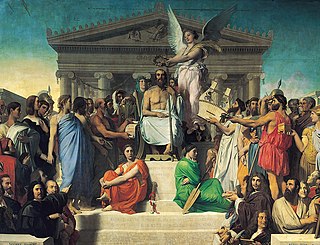
Cassius Longinus was a Greek rhetorician and philosophical critic. Born in either Emesa or Athens, he studied at Alexandria under Ammonius Saccas and Origen the Pagan, and taught for thirty years in Athens, one of his pupils being Porphyry. Longinus did not embrace the Neoplatonism then being developed by Plotinus, but continued as a Platonist of the old type and his reputation as a literary critic was immense. During a visit to the east, he became a teacher, and subsequently chief counsellor to Zenobia, queen of Palmyra. It was by his advice that she endeavoured to regain her independence from Rome. Emperor Aurelian, however, crushed the revolt, and Longinus was executed.
Apsines of Gadara was a Greek rhetorician. He was a native of the Hellenised city of Gadara, whose ruins stand today at the border of Jordan with Syria and Israel. Apsines went on to study at Smyrna and taught at Athens, gaining such a reputation that he was raised to the consulship by the emperor Maximinus. He was a rival of Fronto of Emesa, and a friend of Philostratus, the author of the Lives of the Sophists, who praises his wonderful memory and accuracy.
Fronto may refer to:
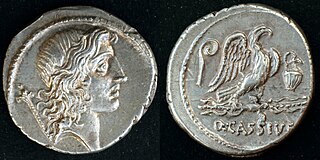
Quintus Cassius Longinus, the brother or cousin of Cassius, was a governor in Hispania for Caesar.
Lucius Junius Gallio Annaeanus or Gallio was a Roman senator and brother of the famous writer Seneca. He is best known for dismissing an accusation brought against Paul the Apostle in Corinth.
Gaius Cassius Longinus was a Roman jurist and politician from the first century AD. A grandnephew of Servius Sulpicius Rufus, he was also a nephew or great-grandson of Gaius Cassius Longinus, one of Caesar's assassins. Longinus was suffect consul of the second half of the year 30 as the colleague of Lucius Naevius Surdinus.

Ariobarzanes III, surnamed Eusebes Philorhomaios, "Pious and Friend of the Romans", was the king of Cappadocia from ca. 51 BC until 42 BC.
Callinicus, surnamed or nicknamed Sutorius or Suetorius, sometimes known as Kallinikos of Petra or Callinicus of Petra was an ancient Greek historian of Arab descent, orator, rhetorician and sophist who flourished in the 3rd century.
Hypsos is a Greek philosophical concept comparable to the modern concept of the sublime, or a moment that brings oral speech to an astonishing and monumental pause. Its root hypso- literally means "aloft", "height", or "on high". However, a distinguishing feature of hypsos in rhetorical studies is that it “combines conflicting emotions: fear and awe, horror and fascinations.” It is a climactic moment in speech that generates uncertainty for the audience.
Gaius Aufidius Victorinus was a Roman senator and general of the second century. A friend of the Emperor Marcus Aurelius and the son-in-law of the advocate and orator Marcus Cornelius Fronto, he was twice consul and governor of several Roman provinces.
References
- ↑ Chisholm 1911, p. 981.
- ↑ "Some grammarians, rhetoricians and sophists from the Suda". Archived from the original on 2010-12-22. Retrieved 2011-02-15.